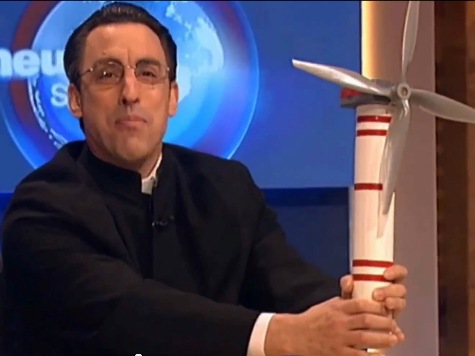
If there are two things we know about the Germans it’s that they don’t have a sense of humour and that they are greener than the Jolly Green Giant’s favourite emerald St Patrick’s Day outfit.
This hilarious video from a German national TV broadcast instantly disproves both:
What I like about it – apart from its sweary joke about kilowatts – is its palpable and honest outrage about Germany’s disastrous state-enforced transition to renewable energy, the so-called Energiewende.
Hitherto one’s instinct towards Germany’s post-Fukushima rejection of nuclear power and the ongoing green energy policy which is crippling its industry has been: well the silly, credulous idiots deserve it. Serves them right for being so green.
But what’s clear from this video is that Germany’s problems are the same as our problems, which is to say that their economic growth and their standards of living are being held hostage by an out-of-touch political class in thrall to a green, activist-driven ideology long past its sell-by date.
As the video notes, every single German must now pay Euros 240 a year (“a total of 21.8 billion Euros for power which on the market had a value of only 2 billion. That’s sick!”) in order to subidise worthless green energy projects – such as the ugly wind farms for which swathes of forest are being cut down and the ludicrous solar panels now found on every other roof (in a country not exactly known for its sunshine) – which, as even Germany’s former Godfather of Green Professor Fritz Vahrenholt has now conceded, are the wrong solution to the wrong problem.
The absurdities of Germany’s energy policy are so myriad and manifest it’s difficult to know where to begin. Since 2005, Germany has spent 100 billion Euros (nearly $140 billion) on green energy. Yet in the last three years, the carbon emissions that this economic suicide was supposed to prevent have actually been increasing. One reason for this is its ban on nuclear energy.
To make up the energy shortfall – wind and solar being hopelessly unreliable at providing baseload power – it has been having to use more filthy lignite-fired power instead. (Which, incidentally, is also happening in Japan) (H/T Benny Peiser GWPF)
It is hitting Germany’s economy hard:
German exports would have been €15bn higher last year if its industry had not paid a premium for electricity compared with international competitors, according to a recent analysis by the Energy Consultancy IHS.Germany’s manufacturing suffered already €52bn in net export losses for the six-year period from 2008 to 2013. The figure was calculated by linking changes in the net volume of German manufacturing exports to changes in energy costs, using an economic model that accounted for other variables such as exchange rates. Almost 60 per cent of the total loss (or €30bn) came in energy-intensive industries: paper, chemicals and pharmaceuticals, non-metallic mineral products and basic metals.
Smaller companies were disproportionately affected. Unlike heavy energy users such as BASF and Thyssen/Krupp, small companies are not eligible for exemptions from the energy bill surcharges that cover the costs of the move to clean energy. Even more worrying for Germany is a clear trend for investment to go abroad. IHS found that direct investment abroad has accelerated at the expense of domestic investment and the cost of energy was the most important driver of this shift.
Yet, as in the rest of the world (with such odd, notable exceptions as Tony Abbott’s Australia which is on the verge of repealing its carbon tax), the insane policy as being driven on by the government regardless of what the people think.
But the present coalition government, despite its intention to lower the burden for consumers and industries, is still determined to double the amount of renewables till 2030.
In the last survey, only 24 per cent of Germans felt confident about their country’s energy policy, while 73 per cent were dissatisfied and ill at ease.
Welcome to the club, Germany.

COMMENTS
Please let us know if you're having issues with commenting.